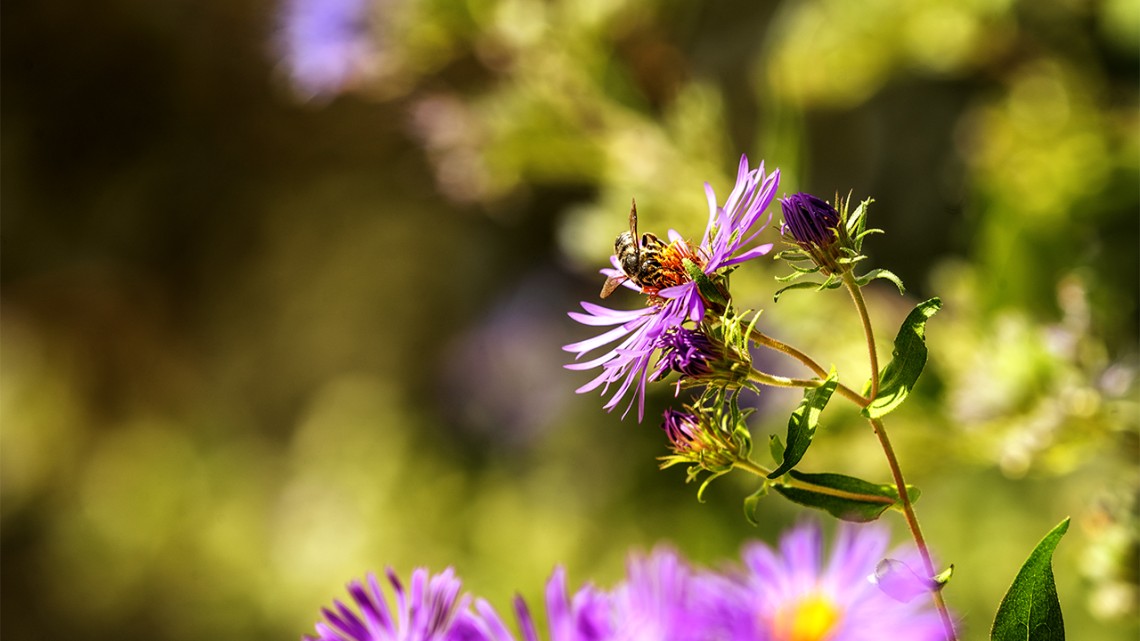
A pollinator visits Minns Gardens. Federal funds through Cornell AES will support dozens of research projects to benefit New York's economy, agriculture and natural resources, including work to protect pollinators.
Projects to support NYS economy, farms, communities
By Krisy Gashler
New USDA grants will fund dozens of research projects across Cornell, from improving the feasibility of sweet potato cultivation in New York to understanding the environmental justice implications of new federal flood-risk ratings.
The 51 Cornell projects that have been funded with a total of $3.8 million are administered through the Cornell University Agricultural Experiment Station (Cornell AES).
One of this year’s projects focuses on the social, economic and environmental causes and consequences of demographic change in rural America. Between 2010-19, 43% of rural counties across the U.S. lost population. Residents in rural counties are older than those in metro or suburban areas, have fewer community and transportation services, and have less access to health care – all problems that were exacerbated during the COVID-19 pandemic, according to Mildred Warner, M.S. ’85, Ph.D. ’97, who leads the project and is a professor in the Department of City and Regional Planning and the Department of Global Development. Warner advocates for an “all-ages” approach to rural planning, which she detailed in a congressional briefing earlier this year.
“Looking at differences across rural and urban areas, so many of our age-friendly and youth-friendly recommendations are really urban-biased,” Warner said. “We need to link planning, design and services in rural areas to build communities that enable more independence for both the very young and the very old.”
Cornell AES supports researchers in the College of Agriculture and Life Sciences (CALS), the College of Human Ecology and the College of Veterinary Medicine, managing applications and distribution of Federal Capacity Funds from the USDA’s National Institute of Food and Agriculture. These yearly federal grants support state-based research activities at land-grant universities to protect the nation’s food supply, economy and natural resources. Individual grants – a maximum of $30,000 per year for three years – provide seed funding for new ideas or bridge funding for ongoing research.
“These funds provide critical support for research projects tailored to the needs of New Yorkers,” said Margaret Smith, director of Cornell AES and associate dean of CALS. “Each year, we have the opportunity to support new projects designed to address ongoing and emerging research needs in the state.”
Some of the other projects funded this year will explore:
- Fighting pests and protecting pollinators: For the past 30 years, farmers have relied on a class of insecticides called neonicotinoids to fight pests like seed corn maggots, which attack corn and soybeans. A growing body of research suggests that neonicotinoids have contributed to the decline of bees and other pollinators. Katja Poveda, associate professor of entomology, is developing alternative methods to control and monitor seed corn maggots by understanding which chemicals attract them.
- Flood risk rating and environmental justice: Flooding is the most common and costly form of natural disaster in New York state, and because of climate change, flood risk is growing. Sharon Tennyson, professor in the Cornell Jeb E. Brooks School of Public Policy, will examine how recent changes in the Federal Emergency Management Agency’s flood-risk rating have impacted federal flood insurance pricing, affordability and takeup in New York, particularly among minority and disadvantaged populations in flood-prone communities.
- Controlling spotted lanternfly: The invasive spotted lanternfly attacks a range of plants, including economically important grapes and stone fruits. First sighted in Pennsylvania in 2014, Cornell researchers and New York state agencies have worked to prevent the pest from infesting New York farms and vineyards. Ann Hajek, professor of entomology, is studying two fungal pathogens that harm spotted lanternflies; laboratory and field studies will test whether these natural pathogens can be recruited to control the pests.
- Sweet potato cultivation: Gaurav Moghe, assistant professor in the School of Integrative Plant Science, Plant Biology Section, is exploring strategies to improve the feasibility of sweet potato cultivation in New York. Moghe will test whether a group of beneficial fungi called arbuscular mycorrhizal fungi (AMFs) can help. The association of plants with AMFs goes back to 400 million years ago and has been one of the most enduring adaptations in land plants The fungi work symbiotically with many plants, creating an extended root system that enables plants to pull more nutrients from soils, cope with non-ideal soil conditions like high acidity or heavy metal contamination, and tolerate extreme temperatures, both hot and cold.
Krisy Gashler is a writer for the College of Agriculture and Life Sciences.
Media Contact
Abby Kozlowski
Get Cornell news delivered right to your inbox.
Subscribe

